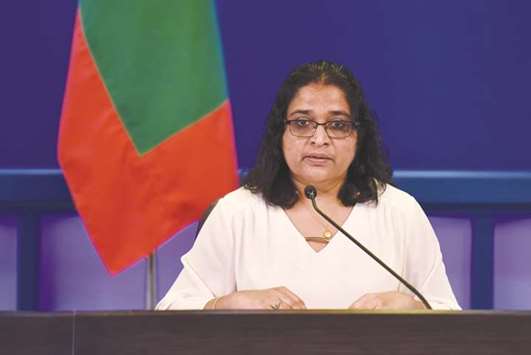Maldives President Abdulla Yameen declared a 15-day state of emergency yesterday, deepening a political crisis in the country that has pitted its leader against the nation’s top court.
Traditionally known as a honeymooners’ paradise, the Maldives has been plunged into chaos in recent years amid a crackdown on dissent, with the president jailing almost all the political opposition since he came to power in 2013.
A standoff between Yameen and the Supreme Court began last week when the president refused to comply with its order to release nine political dissidents and restore the seats of 12 legislators who had been sacked for defecting from Yameen’s party.
The court’s surprise move on Thursday gave Yameen’s opponents the majority in the 85-member assembly, meaning they could potentially impeach the president.
In a stunning blow to the regime, it also paved the way for exiled former president Mohamed Nasheed - the first democratically elected but who was controversially convicted of terrorism in 2015 - to return and run for president this year.
But the Yameen government has so far refused to comply with the ruling, shuttering parliament and on Sunday ordering police and troops to resist any move by court to arrest or impeach Yameen.
The crisis intensified yesterday as Yameen’s aide Azima Shukoor announced the state of emergency on national television.
“The reason for the declaration is that the Supreme Court’s ruling was obstructing the functioning of the government,” Azima said.
The emergency declaration gives sweeping powers to security forces to arrest and detain individuals, curtails the powers of the judiciary and bars parliament from impeaching Yameen.
But it must be officially conveyed to parliament within two days, according to officials.
Opposition legislator Eva Abdulla said the declaration showed the regime was under pressure.
“A very desperate move. Shows he has lost everything- confidence of the people, Parliament, other institutions and the courts. He has no democratic mandate and must resign immediately,” she said on twitter.
Nasheed, who had previously expressed fears of unrest in the troubled Indian Ocean nation, said the emergency declaration amounted to imposing martial law.
“(This) is tantamount to a declaration of martial law in the Maldives,” he said in a statement, while urging regional super power India to intervene swiftly to end the worsening crisis.
Yameen has faced several unsuccessful opposition attempts to impeach him for alleged
corruption.
The president yesterday accused the Supreme Court judges of encroaching on his authority, sending his objections to the court in three separate letters.
There was no immediate reaction from the court.
The opposition has meanwhile urged the international community to pressure Yameen into respecting the court and end the crisis.
“We request the international community, including India, Sri Lanka, the US, Britain, the EU... to do everything in their power to help return power to the people of the Maldives and restore democracy,” opposition legislators said.
The United Nations, Australia, Britain, Canada, India and the United States previously welcomed the court’s decision as a move towards restoring
democracy in the archipelago.
UN Secretary General Antonio Guterres at the weekend also called for “restraint” as the crisis escalated.
Strongman Yameen has been defiant in the face of international pressure so far, ordering the arrest of two opposition lawmakers, who were later freed by a court, and staging a rally late Sunday with hundreds of supporters in the capital Male.

In this handout picture, Presidential aide Azima Shukoor speaks during a TV broadcast announcing a state of emergency in Male yesterday.
